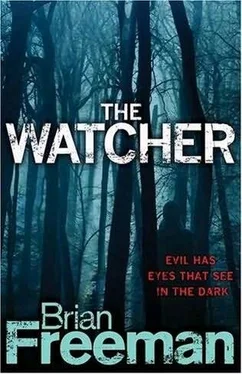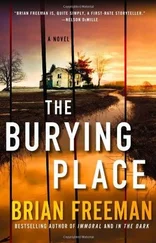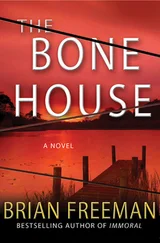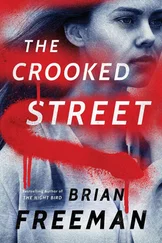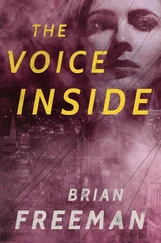“We’ll get her help,” her father said.
Stride and Maggie left the family and returned to the pounding rain outside the house. Both of them switched on flashlights and swept the beams like searchlights ahead of them as they made their way to the backyard. The grass was sodden under their feet. Streams poured out of the swollen gutters. Behind the house, the lot was large and flat and dotted with evergreens. Stride could see the next street more than a hundred feet away. As he shined his flashlight through the grass, pools of standing water glistened back at him.
The room on the corner was Angela’s bedroom. The light was on, and the blinds were shut. Stride examined the grass underneath her window.
“Nothing,” he said.
“Maybe the rain washed away his footprints,” Maggie replied.
Stride shook his head. “He can’t have been this close. If he was standing here, she would have seen him.”
He examined the rest of the yard. Lightning turned the night to day for an instant. Stride saw disarray in the wet ground, twenty feet from Angela’s window. He used the flashlight to guide his footsteps to a soggy patch of mud and lawn beneath one of the fir trees, where tree roots bulged from the wet soil. In the cone of light, he saw a mess of footprints and crushed grass.
Maggie bent down and studied the overlapping tread marks. “Two different sets,” she said. “Looks like a fight.”
Stride spotted a single line of tracks leading away from the scene toward the street. He followed them with his flashlight. Where they passed through a bare patch of dirt, the prints in the mud were deep and clear.
“He was carrying someone,” Stride said, pointing to where the heel marks sank like weights into the soft earth.
“I think we’re running out of time, boss,” Maggie said.
They followed the footprints to the street, where they disappeared. Water overflowed from the sewers and poured along the curb in a river. Stride wiped rain from his eyes. He jogged to the vacant lot on the opposite side of the block to see if the footprints started again, but he couldn’t find the trail. Clark and Finn had both vanished.
Stride gestured to Maggie, pointing her to the south, while he followed the street to the north, running down the middle where the flooding was lightest. Twin rivers surged through the gutters. He used intermittent bursts of lightning to see between the houses and down the long stretches of asphalt. Each subsequent drumbeat of thunder was closer and longer. The storm was getting worse, not better, and the atmosphere felt violent around him, as if the pressure in the air were building toward an explosion. Wet cold worked its way inside his bones. Trees bowed over his head with the rotating winds, and when he stopped in the dead center of an intersection where two wide streets met, he felt small.
Another branch of lightning cut open the sky, looking like a hangman drawn by a child. Right then and there, Stride saw it. Three blocks away, glinting in the white light, was a silver RAV, parked under the sagging branches of an elm tree. He splashed through deep water. His feet sloshed inside his boots. As he got closer, he saw Maggie, sprinting for the RAV from the opposite direction. They arrived at almost the same time and slowed to study the ground around the truck. Both of them shot their flashlight beams inside the RAV, expecting to see Finn’s body slumped in back. Instead, the truck was empty.
“Finn never made it back here,” Maggie said.
“Did you spot Clark’s truck?”
She shook her head and got down on her knees. “Hang on, there’s something caught under the tire.”
Stride saw it, too. Maggie reached around beneath the chassis of the RAV and extracted something white from under the rubber of the tire. When she held it up, they saw that it was a wallet-sized photograph, dirty and wet. She illuminated it with the beam of her flashlight.
“It’s Clark and Mary Biggs,” she said.
“Do you think he left it there for us?”
Maggie shook her head. “It probably fell out of his pocket.”
“If Clark grabbed Finn, where would he take him?” Stride asked.
“I don’t know. Unless he already killed Finn and dumped the body somewhere else.”
Stride put himself in the shoes of a despondent father, confronting the man who had driven his daughter to her death. “I think if he was going to kill him, he’d have done it outside Angela’s window.”
“I’ll get more cars on the street, but we’re at a dead end.”
“What about Perch Lake Park?” Stride asked. “That’s where the girl died.”
“That was my first thought, but the parking lot was empty,” Maggie said. “I’ve got a car waiting in case he shows up.”
“What about Donna? She might know where Clark would go.”
Maggie nodded. “I’ll call her.”
She reached into her pocket for her phone, then stopped. “Wait a minute,” she said, shining a light on the picture again. “Where do you think this photograph was taken?”
Stride leaned closer. “It’s a beach somewhere around here. Probably along the Point. You can see the lake in the background.”
“We’re not too far from the Wisconsin Point, are we?”
“It’s just a few miles to the south.”
Maggie shoved the photograph in her pocket. “Clark told me that he used to take Mary out to the Point. It was one of their favorite places.”
“You think that’s where he took Finn?”
“It’s isolated, it’s close by, it reminds him of Mary.”
“That sounds like our best bet,” Stride said.
“How fast can you go?” Maggie asked.
Clark dragged Finn’s body one-handed through the wet sand by the belt tied around the man’s ankles. In his other hand, he dangled the baseball bat over his shoulder. As the uneven ground jolted Finn’s body, the bound man awakened and began to struggle, clawing at the mud for traction with his fingers. He spat out grass and dirt from his mouth and screamed. Clark ignored his cries, which were drowned out by the ferocious wailing of the wind and the beating of lake waves against the shore.
The beach was a long, lonely strip of sand and trees. The sky belched out rain and blinded him with a near-continuous chain of lightning flashes. Somewhere, he could smell wood burning, where electricity had blasted through bark and roots. The thunder was so near and loud that he felt the earth tremble under his feet. If he had believed in God, Clark would have believed that God was angry, but he had given up his faith long ago. He had stopped believing on that day when Mary first went into the water and came out a ghost of who she had once been.
There was no God, he realized then. No mercy.
Clark was not prepared to show any mercy tonight.
He dropped Finn in the empty center of the beach, where a fat, bleached tree trunk had washed up after months rolling and floating on the surface of the lake. It was bare and white, pockmarked with insect holes drilled into its wood. He grabbed a fistful of Finn’s shirt and propped him with his back against the tree trunk. Blood trickled down Finn’s face where brambles and rocks had scraped open his skin, but the rain quickly washed it away. Finn’s ankles strained at the belt that secured them, and his muscles twitched with fear.
“Who are you?” Finn asked. He was practically screaming, but his voice was a whisper.
“You killed my daughter,” Clark said.
Finn gazed in horror at Clark, who was as big and broad as a bear. He read the hardness of Clark’s face and knew immediately who Clark was and what Clark planned to do. Finn’s torso slid off the tree trunk, and he crawled away, dragging his feet behind him, his body flopping like a fish on the bottom of a boat. Clark took two steps and yanked him back by the collar of his shirt. When Finn was upright again, Clark drove the head of the bat like a spear into Finn’s stomach, so hard that blood and stomach juices spewed from Finn’s mouth. When Finn took a breath, there was nothing in his lungs, and his fingers clutched the sand in panic as he gasped for air. Tears mingled with the rain on his face.
Читать дальше
